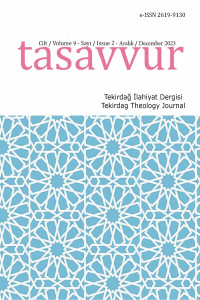Varoluşsal Suç Bağlamında Gerçekleşen Ontolojik Çatışmalar
Ontological Conflicts in the Context of Existential Guilt
Author(s): Özlem AteşSubject(s): Existentialism, Philosophy of Religion, Sociology of Religion, Ontology
Published by: Tekirdağ Namık Kemal Üniversitesi İlahiyat Fakültesi
Keywords: Philosophy of Religion; Sin; Ontology; Freedom; Existence;
Summary/Abstract: Human existence is a reality built on paradoxical structures. Existence takes place in the state of balance between these structures on its ground. Since man is in a constant state of being the states of equilibrium that take place on the ontological ground are constantly pregnant with new states of equilibrium. Whatever the subject of human-related research is to be done, it is necessary to look for a basis in these structures the issue of sin or existential crime is also based on these structures in terms of its ontological background. In our study, the processes by which the rhythm states of the structures in question, which occur in situations of conflict and harmony, produce an unreal existence, that is, existential crime, have been handled. The issue of existential crime is mostly depicted from the perspective of the existentialist approach and in its onto-theological context. The main motive that makes the study important for us is related to the relation of existential crime and/or sin to human existence itself from an existential perspective. While dealing with the issue of existential crime, the picture of the issue has been tried to be presented with a more descriptive method, and various analyzes have been made where necessary. The freedom-destiny paradox has attached the tragic to human existence, and as a result, the sin situation caused by the hopelessness and anxiety in the tragic has been encountered. The dynamic-form conflict has attached the dramatic to human existence, and the sinfulness that seeks pleasure from the meaninglessness and emptiness caused by the pain in the dramatic has emerged. The conflict of individuality-participation, on the other hand, has attached the tragicomic to human existence, and the sinfulness of the ego based on self-deception arising from the identity problem caused by the tragicomic has emerged. The argument that all this is based on and that we want to be seen is that sin does not originate from some superficial motives, but from its dyadic structure, which is the ground of human existence, and on the other hand, an ontological background that expresses necessity for its existence. To sin can make a person guilty, but the existence of the possibility to sin is an existential vacancy that makes man a free being and expresses necessity for the realization of existence.
Journal: Tasavvur Tekirdağ İlahiyat Dergisi
- Issue Year: 9/2023
- Issue No: 2
- Page Range: 1701-1731
- Page Count: 31
- Language: Turkish

